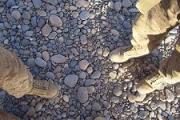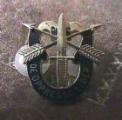NAVAL SUBMARINE BASE KINGS BAY, Ga. – Defense Secretary Chuck Hagel and Chairman of the Joint Chiefs of Staff Army Gen. Martin E. Dempsey are seeing initial assessments submitted daily from teams in Iraq, but only the full range of assessments seen as a whole will tell the story in Iraq, Hagel said July 9.
The secretary spoke with local and traveling media at this southeast Georgia installation.
Reporters asked Hagel about U.S. military efforts in Iraq that are focused on two missions: securing the American Embassy and personnel in Baghdad and assessing the situation in the country and advising Iraqi security forces. The strategy involves supporting Iraqi forces and helping Iraq's leaders resolve the political crisis that enabled the advance of the armed militant extremist group the Islamic State of Iraq and the Levant, or ISIL, also known as ISIS.
On July 1, the United Nations reported that Iraq’s violent insurgency had claimed 2,400 lives, half of them civilians, during June. The U.N. added that June was the deadliest month in the country since 2007.
The secretary said he and Dempsey are receiving updates from Army Gen. Lloyd J. Austin III, commander of U.S. Central Command and the person in charge of overseeing U.S. military security and assessment efforts in Iraq, based on each 24-hour report he gets.
These glimpses, Hagel said, “are starting to form and shape a picture of what our guys are picking up. But they're not complete.”
The full context of the different assessments will include information on such topics as the strength of ISIL and strength and depth of tribal integration into ISIL, he said. Another assessment topic might include learning the strength and capacity of Iraqi security forces as they have pushed further outside Baghdad, Hagel added.
About 640 troops are divided between the two missions, Pentagon Press Secretary Navy Rear Adm. John Kirby said at a July 8 news conference. The assessment mission includes six teams, based mostly in and around Baghdad, and two joint operations centers, one in Baghdad and one in Irbil, the admiral said.
Manned and unmanned intelligence, surveillance and reconnaissance flights have increased sharply since the assessment first started, he said, from an initial 30 to 35 daily sorties to about 50 now.
The assessments are nearing the end of their initial phase, which was expected to take two to three weeks, Kirby said.
Responding to a question about media reports of ISIL taking control last month of a former Iraqi chemical weapons plant, Hagel said the United States has known about the facility for years. The chemicals inside the facility “are not chemical weapons munitions, they are not weaponized,” he said. “They are old chemicals from many years ago,” he added. “We know where they are, we've known about them, we're keeping our eye on them.”
In 2004, the CIA published the 1,000-page Comprehensive Report of the Special Advisor to the Director of Central Intelligence on Iraq's Weapons of Mass Destruction. The portion that covers Iraq’s chemical warfare program describes the complex’s history.
“The entire Al Muthanna mega-facility was the bastion of Iraqi’s chemical weapons development program,” the report says. “During its peak in the late 1980s to early 1990s, it amassed mega-bunkers full of chemical munitions, and provided Iraq with a force multiplier sufficient to counteract Iran’s superior military numbers. Two wars, sanctions and [United Nations Special Commission] oversight reduced Iraqi’s premier production facility to a stockpile of old damaged and contaminated chemical munitions (sealed in bunkers), a wasteland full of destroyed chemical munitions, razed structures, and unusable war-ravaged facilities.”
Hagel said the United States is assisting in every way it can “to help the Iraqi people defeat the brutal fundamentalists that are attempting not just to destabilize Iraq, but essentially take control of Iraq.”
The assessments will be completed in the next few days, he added, “and we'll have a further context of what recommendations they'll make.”
“In the meantime,” he said, “we're doing everything we can … in those two general areas: protect our people and assist the Iraqi security forces in their efforts to defeat ISIL.”
The secretary said the American people and Congress should not make the mistake of thinking ISIL is not a threat to the United States.
“This is a force that is sophisticated, it's dynamic, it's strong, it's organized, it's well financed [and] it's competent,” Hagel said. “It is a threat to our allies all over the Middle East. It's a threat to Europe. It's a threat to every stabilized country on Earth, and it's a threat to us.”
Though ISIL may not appear to be an imminent threat to the United States, the secretary said, it is a threat to the United States and poses a clear and imminent threat to U.S. partners in the area.
Hagel noted current events in Syria, Lebanon, Israel, the Gaza Strip, Libya and Egypt.
“There is hardly a stable country in that area of the Middle East, and that's very dangerous for all of us,” he said











Bookmarks